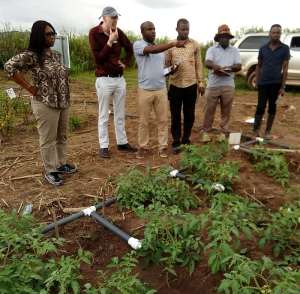
Research scientists from the Crops Research Institute (CRI) of the Council for Scientific and Industrial Research (CSIR) in collaboration with the Lancaster University are working on a technology that will ensure sustainable cultivation of tomato and other food crops in Ghana.
Scientists leading the five year research project ongoing at Fumesua in the Ejisu Municipality in the Ashanti region hinted, that the 'Water for Food Production', a component of the RECIRCULATE project is aimed at developing efficient water and soil nutrients management approach for sustainable tomato and other food crops production in the country.
According to the research team, the first phase of the project, made up of three years began in November 2017 and ends in 2020 after which the second phase will continue.
Ing. Dr Patricia Oteng-Darko, a research scientist leading the 'Managing Water and Soil Nutrients to Maximize Tomato Production' project disclosed that more than 85 percent of tomatoes produced in the country is done through irrigation while the remaining percentage depend on seasonal rainfall, which both require 100 percent usage of water and large quantities of soil nutrients such as nitrogen fertilizer.
Ing. Oteng - Darko expressed the fear that the current farming approach may not be sustainable in the near future due to climate change and other environmental factors.
She disclosed that the research team is therefore understudying four irrigation regimes including the existing traditional irrigation method.
She indicates that scientists at the end of the research period would be able to identify the most sustainable regime (regimes) for farmers to adopt.
Ing. Dr Patricia Oteng-Darko revealed that the alternate furrow irrigation technology, one of the four regimes being tested is targeted to reduce water usage for tomato production by 75 percent whilst maximising yield to boast production for both domestic consumption and export.
Dr Stephen Yeboah, Principal Investigator of the project said the research work is participatory between CSIR scientists and holder farmers.
He explained that over 100 tomato farmers from the Ejisu and Juabeng Municipalities both in the Ashanti region and within the catchment area of the Council are periodically invited to the demonstration field to witness the research process.
He further disclosed that the team intends to reach out to more farmers within and outside the confines of the Crops Research Institute during the second year of the first phase of the project for more farmers to be conversant with the methodologies being used to develop the technology.
According to Dr. Stephen Yeboah, involving holder farmers in the research process will help them to understand the process involved in the technology application and motivate them to adopt it to increase yield without much difficulty.
The director of the Crops Research Institute (CRI) of the Council for Scientific and Industrial Research (CSIR), Dr. Stella Ama Annin, noted that the availability of sufficient quantity of water to adequately support human activities such as food crops production in the future cannot be guaranteed in the face of climate change.
Dr. Stella Annin said it is for this reason that her institute (CRI) and it's international partner (Lancaster University) saw the need for scientists to be proactive and came out with the idea of developing sustainable farming technologies that require less water and soil nutrients usage without compromising yield to ensure sustainable farming.
The director stressed that sustainable farming technologies such as the 'Managing Water and Nutrients to Maximize Tomato Production' is the only means to achieve food security, improve food nutrition and reduce poverty in the era of climate change.
Professor Ian Dodd of the Lancaster University - Environment Centre and Co- Leader of Work Package Three( WP3) of the 'Water for Food Production' project under RECIRCULATE, commended the council and the research team for the progress of work so far during his working visit to the research demonstration field at Fumesua last week.
He encouraged the research team to be focused and work hard on the project in order to achieve the intended results.
He also assured his Ghanaian counterparts Lancaster University's commitment to provide the council and the research team with the necessary technological support to make the project successful.
Dr. Stephen Yeboah ( Third from right )showing Professor Ian Dodd of Lancaster University the research procedure as the Director of the CRI-CSIR, Dr. Stella Ama Annin and other research scientists look on.




 Former Kotoko Player George Asare elected SRC President at PUG Law Faculty
Former Kotoko Player George Asare elected SRC President at PUG Law Faculty
 2024 elections: Consider ‘dumsor’ when casting your votes; NPP deserves less — P...
2024 elections: Consider ‘dumsor’ when casting your votes; NPP deserves less — P...
 You have no grounds to call Mahama incompetent; you’ve failed — Prof. Marfo blas...
You have no grounds to call Mahama incompetent; you’ve failed — Prof. Marfo blas...
 2024 elections: NPP creates better policies for people like us; we’ll vote for B...
2024 elections: NPP creates better policies for people like us; we’ll vote for B...
 Don’t exchange your life for wealth; a sparkle of fire can be your end — Gender ...
Don’t exchange your life for wealth; a sparkle of fire can be your end — Gender ...
 Ghana’s newly installed Poland train reportedly involved in accident while on a ...
Ghana’s newly installed Poland train reportedly involved in accident while on a ...
 Chieftaincy disputes: Government imposes 4pm to 7am curfew on Sampa township
Chieftaincy disputes: Government imposes 4pm to 7am curfew on Sampa township
 Franklin Cudjoe fumes at unaccountable wasteful executive living large at the ex...
Franklin Cudjoe fumes at unaccountable wasteful executive living large at the ex...
 I'll 'stoop too low' for votes; I'm never moved by your propaganda — Oquaye Jnr ...
I'll 'stoop too low' for votes; I'm never moved by your propaganda — Oquaye Jnr ...
 Kumasi Thermal Plant commissioning: I pray God opens the eyes of leaders who don...
Kumasi Thermal Plant commissioning: I pray God opens the eyes of leaders who don...
